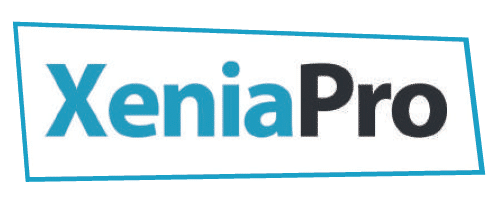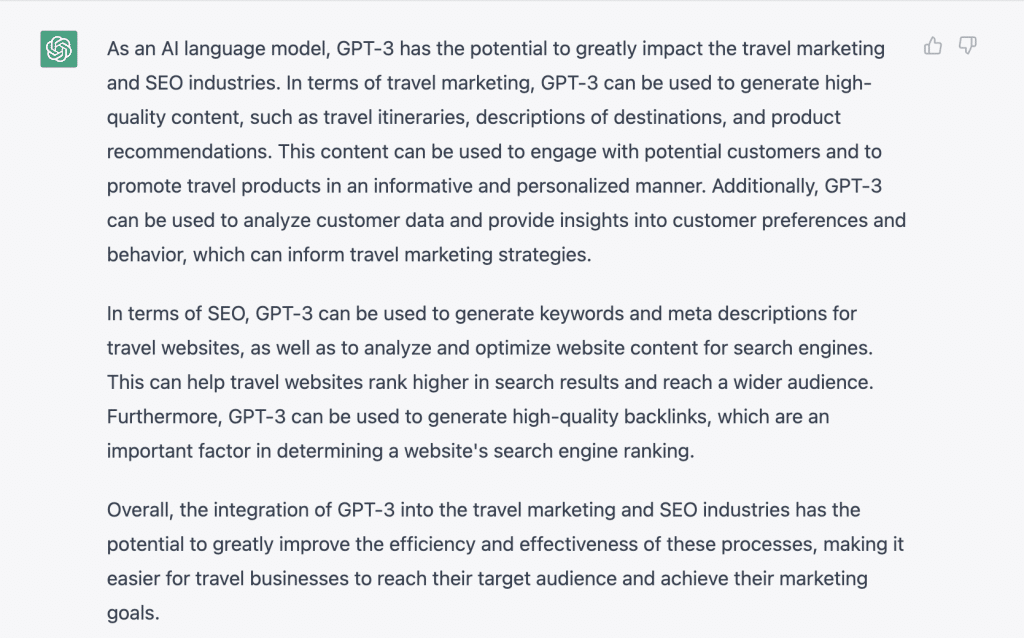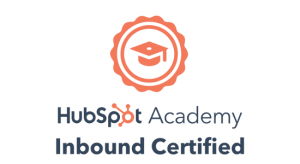
By now it is on everyone’s lips, ChatGPT is a real revolution that we have witnessed with our own eyes. I think for every one of us who has tested this chatbot, skepticism has paved the way to genuine interest.
Artificial Intelligence represents is the future: if used well, it is a competitive advantage for people and companies. These new technologies are totally revolutionizing the B2B travel market. Take ChatGPT for instance, the clear example of how technology can be used to improve customer experience, personalize messages and optimize business processes.
If you also work in Travel Marketing, Content and SEO have you ever wondered how to implement it in your workflow?
What is ChatGPT
Firstly, what is ChatGPT? An artificial intelligence chatbot developed by OpenAI that can generate dialogues, responses and texts based on a given prompt or context.
The acronym stands for “Generative Pre-trained Transformer,” which is a machine learning language model that makes interaction and exchange intuitive, automatic, and (almost) human-quality. It is based on a neural network that has literally been trained on a huge database of content retrieved from books, websites, articles.
The result? A conversational tool that processes natural language in versatile ways and uses machine learning algorithms to give answers, as we do within a speech. Amazing, isn’t it?
The impact on Travel Marketing and SEO
We have asked him first. Let’s see what the chatbot thinks.
After several tests and patterns, here are the four things we think you should know about ChatGPT if you work with Travel Marketing and SEO.
1# ChatGPT is efficient but not very creative
ChatGPT is capable of generating large amounts of content quickly and with a high degree of accuracy. It is definitely a support to the editor who has to handle many outputs at the same time. Beware, however: as we see from the example below, texts created are often repetitive and with simple and easily detectable syntax. If you ask the chatbot the same question, it will answer you with different words each time, ensuring a kind of originality in the text, while dealing with the same themes and with little creativity. If you work in the tourism industry, in a niche or a small destination, you will see that as you go along, this repetitiveness jumps out at you more and more.
2# ChatGPT can be customized but requires very specific instructions
ChatGPT can be coached on specific datasets to produce content that follows a specific register and style. ChatGPT requires detailed instructions to produce higher quality content that is more likely to be original or take a specific point of view. The more instructions it is given, the more sophisticated the output will be. This is both a strength and a limitation to keep in mind.
3# ChatGPT relies on data but is not 100% up-to-date
ChatGPT’s understanding, being a machine, relies on available data, as of now updated to 2020. So if you need fresh information, ChatGPT is not reliable. The reason is not only that it is updated in terms of historical times, but also because the model only predicts which words should come after the previous word in a sentence of a paragraph on a given topic.
How to use it in Travel Marketing, Content and SEO
Our advice? The chatbot can be a great support in the more repetitive tasks for keyword analysis and research, ideas for the editorial plan, for creating FAQs from customer service information materials. The chatbot can also help you generate a draft of SEO-friendly content, including relevant keywords and key phrases that can help improve a website’s search engine rankings. But it will always take the human guidance of the copy and editor to continue to write creative and always original text. Using it can be a real added value, if supervised by professionals. A support and not a replacement: “AI Will Not Replace You. A Person Using AI Will.”
It is therefore critical to take the necessary precautions to understand, monitor and mitigate the margin of error of such a powerful tool. The technology has the potential to increase efficiency, personalization, and multilingual capabilities, but it is important to consider the limitations and ethical implications through our expertise.


